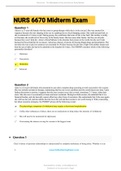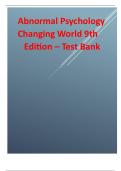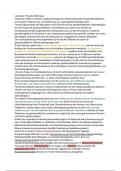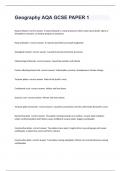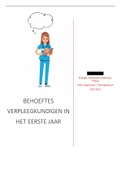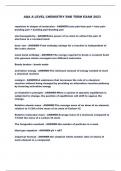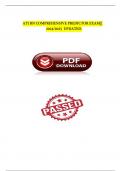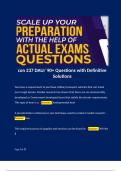Wetenschapsfilosofie
Inhoud
Module 1..................................................................................................................................................2
1.2 Wat is wetenschap...............................................................................................................................2
1.3 Logica...................................................................................................................................................2
Module 2........................................................................................................................................................3
2.1 Historische achtergrond.......................................................................................................................3
2.2 Wetenschap en taal.............................................................................................................................3
2.3 Het Logisch Positivisme........................................................................................................................4
Module 3........................................................................................................................................................5
3.1 Problemen met Logisch Positivisme.....................................................................................................5
3.2 Popper..................................................................................................................................................5
Module 4........................................................................................................................................................7
4.1 Duhem en Quine..................................................................................................................................7
4.2 Kuhn.....................................................................................................................................................8
4.3 Conclusie..............................................................................................................................................9
Module 5........................................................................................................................................................9
5.1 De wetenschap Bedrijfskunde..............................................................................................................9
5.2 Manieren van verklaren.....................................................................................................................10
5.3 Industrial Organization vs. Resource-Based View..............................................................................10
5.4 Systeemdenken..................................................................................................................................11
5.5 Institutionele Theorie.........................................................................................................................11
Module 6......................................................................................................................................................12
6.1 Rational Choice Theory......................................................................................................................12
6.2 Agency Problems................................................................................................................................12
6.3 Game Theory......................................................................................................................................13
6.4 Evaluatie van Rational Choice Theory................................................................................................13
Module 7......................................................................................................................................................14
7.1 Kwantitatief onderzoek......................................................................................................................14
7.2 Kwalitatief onderzoek........................................................................................................................14
, Module 1
Wetenschapsfilosofie is het fundament onder de wetenschap. Bij filosofisch denken wordt er gebruik
gemaakt van systeem 2: langzaam maar betrouwbaar.
1.2 Wat is wetenschap
Demarcatie: er is een scheiding tussen wetenschappen en pseudowetenschappen (niet-
wetenschappen). Zo is natuurkunde wel een wetenschap, maar astrologie niet.
Veel wetenschappelijke kennis is niet honderd procent bewezen. Toch is het de meest betrouwbare
vorm van kennis. Je kunt wetenschap ook zien als een bepaalde methode om kennis te vulgaren. De
methode is bedoeld om bewijs verzamelen voor stellingen waarbij je bereid bent om stellingen aan
te passen als het bewijs daarom vraagt. Hier komt vaak een bepaalde houding bij kijken.
- Sceptisch: noch oneens, noch eens. De beoordeling wordt hierbij uitgesteld. Deze houding
is als het ware een wapen tegen denkfouten uit systeem 1: snel maar onbetrouwbaar.
Onze hersenen zijn niet gemaakt om wetenschappelijke waarheden te vinden. De menselijke geest
zoekt eerder naar patronen om de werkelijkheid te beïnvloeden. Hierdoor ontstaat de strijd tegen
het bijgeloof.
1.3 Logica
Logica is de uitgewerkte vorm van systeem 2.
Premisses zijn aannames. Op basis hiervan mogen we
conclusies trekken, want als de aannames waar zijn, weten
we zeker dat de conclusie ook waar is.
- Truth perservation: bij een logisch valide
argument leiden ware premisses altijd tot ware
conclusies.
De validiteit van een argument wordt gebaseerd op de logische vorm. Hierdoor kan een valide
argument berusten op onjuiste premisses en daardoor mogelijk op een onjuiste conclusie. Als niet
alle premisses waar zijn, weten we niet of de conclusie juist is. Een invalide argument is een fout in
de logica. Hierbij volgt de conclusie niet uit de premisses.
Verschillende vormen
Modus ponens: de eerste premisse is een voorwaardelijke uitspraak.
- alle A zijn B > X is een A > Dus: X is B
Modus tollens (‘als p dan q’): wanneer q onwaar is, is het antecedent p ook onwaar.
- Als A, dan B > B is onwaar > Dus: A is onwaar
- Iedereen die A is, is B > X is niet B > Dus: X is niet A
Bevestiging van de consequent: als A, dan B > B > Dus: A. Deze argumenten kloppen logisch niet.
- Als je naar New York gaan, neem je het vliegtuig > Je neemt een vliegtuig > Dus: je gaat
naar New York.
Ontkenning van de antecedent: als A, dan B > A is onwaar > Dus: B is onwaar
Inhoud
Module 1..................................................................................................................................................2
1.2 Wat is wetenschap...............................................................................................................................2
1.3 Logica...................................................................................................................................................2
Module 2........................................................................................................................................................3
2.1 Historische achtergrond.......................................................................................................................3
2.2 Wetenschap en taal.............................................................................................................................3
2.3 Het Logisch Positivisme........................................................................................................................4
Module 3........................................................................................................................................................5
3.1 Problemen met Logisch Positivisme.....................................................................................................5
3.2 Popper..................................................................................................................................................5
Module 4........................................................................................................................................................7
4.1 Duhem en Quine..................................................................................................................................7
4.2 Kuhn.....................................................................................................................................................8
4.3 Conclusie..............................................................................................................................................9
Module 5........................................................................................................................................................9
5.1 De wetenschap Bedrijfskunde..............................................................................................................9
5.2 Manieren van verklaren.....................................................................................................................10
5.3 Industrial Organization vs. Resource-Based View..............................................................................10
5.4 Systeemdenken..................................................................................................................................11
5.5 Institutionele Theorie.........................................................................................................................11
Module 6......................................................................................................................................................12
6.1 Rational Choice Theory......................................................................................................................12
6.2 Agency Problems................................................................................................................................12
6.3 Game Theory......................................................................................................................................13
6.4 Evaluatie van Rational Choice Theory................................................................................................13
Module 7......................................................................................................................................................14
7.1 Kwantitatief onderzoek......................................................................................................................14
7.2 Kwalitatief onderzoek........................................................................................................................14
, Module 1
Wetenschapsfilosofie is het fundament onder de wetenschap. Bij filosofisch denken wordt er gebruik
gemaakt van systeem 2: langzaam maar betrouwbaar.
1.2 Wat is wetenschap
Demarcatie: er is een scheiding tussen wetenschappen en pseudowetenschappen (niet-
wetenschappen). Zo is natuurkunde wel een wetenschap, maar astrologie niet.
Veel wetenschappelijke kennis is niet honderd procent bewezen. Toch is het de meest betrouwbare
vorm van kennis. Je kunt wetenschap ook zien als een bepaalde methode om kennis te vulgaren. De
methode is bedoeld om bewijs verzamelen voor stellingen waarbij je bereid bent om stellingen aan
te passen als het bewijs daarom vraagt. Hier komt vaak een bepaalde houding bij kijken.
- Sceptisch: noch oneens, noch eens. De beoordeling wordt hierbij uitgesteld. Deze houding
is als het ware een wapen tegen denkfouten uit systeem 1: snel maar onbetrouwbaar.
Onze hersenen zijn niet gemaakt om wetenschappelijke waarheden te vinden. De menselijke geest
zoekt eerder naar patronen om de werkelijkheid te beïnvloeden. Hierdoor ontstaat de strijd tegen
het bijgeloof.
1.3 Logica
Logica is de uitgewerkte vorm van systeem 2.
Premisses zijn aannames. Op basis hiervan mogen we
conclusies trekken, want als de aannames waar zijn, weten
we zeker dat de conclusie ook waar is.
- Truth perservation: bij een logisch valide
argument leiden ware premisses altijd tot ware
conclusies.
De validiteit van een argument wordt gebaseerd op de logische vorm. Hierdoor kan een valide
argument berusten op onjuiste premisses en daardoor mogelijk op een onjuiste conclusie. Als niet
alle premisses waar zijn, weten we niet of de conclusie juist is. Een invalide argument is een fout in
de logica. Hierbij volgt de conclusie niet uit de premisses.
Verschillende vormen
Modus ponens: de eerste premisse is een voorwaardelijke uitspraak.
- alle A zijn B > X is een A > Dus: X is B
Modus tollens (‘als p dan q’): wanneer q onwaar is, is het antecedent p ook onwaar.
- Als A, dan B > B is onwaar > Dus: A is onwaar
- Iedereen die A is, is B > X is niet B > Dus: X is niet A
Bevestiging van de consequent: als A, dan B > B > Dus: A. Deze argumenten kloppen logisch niet.
- Als je naar New York gaan, neem je het vliegtuig > Je neemt een vliegtuig > Dus: je gaat
naar New York.
Ontkenning van de antecedent: als A, dan B > A is onwaar > Dus: B is onwaar


